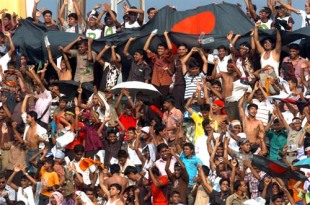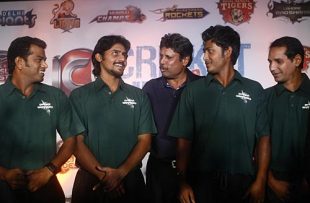A year to forget
|
|

|
On the first day of their cricket in 2008, Bangladesh were bowled out for 137, and New Zealand scored 156 for 4. January 4 in Dunedin summed up Bangladesh's year.
With a start like this, we wondered how it would end. The answer will be known to us on the last day of the year, the last day of the Mirpur Test against Sri Lanka. The fourth day of the Test will be a rest day - a phenomenon seen after years - because of general elections. The joke doing the rounds is that the authorities need not have bothered: a Bangladesh Test usually ends in three days.
Should this Test prove to be the exception to the rule and run the course, it will be seen as a big achievement for Bangladesh. Which, given that they have been in Test cricket for eight years, makes it clear that Bangladesh clearly haven't been able to get to where they should have.
There may, of course, be objections to this assertion from Bangladesh players. The captain, Mohammad Ashraful, might want to remind us of the home series against New Zealand in October. Not because Bangladesh actually drew a Test - rain had a bigger role to play in that Mirpur draw. Ashraful will instead talk about the first Test of the series, when they entertained thoughts of a victory till tea on the last day. While they eventually lost, the victory in the first ODI, and the chance they had of winning the next two will be the happiest memories for Bangladesh cricket in 2008.
Outside this is perennial despair. Apart from that victory against New Zealand, Bangladesh won four of the 26 ODIs they played, but those wins came against Ireland and UAE, which is not compatible with the promises of the previous year. Bangladesh have not been able to live up to the expectations raised by their performance in the 2007 World Cup, where they beat India, got to the Super Eights and beat South Africa there, and assumed their place, though temporarily, among cricket's respectable teams. They haven't threatened to occupy that seat again.
The Test year has been great fun. Bangladesh have played eight Tests (before the start of the series against Sri Lanka) - all against New Zealand and South Africa, both home and away. The performances at home and away have been completely different. New Zealand were made to sweat for their series win in October. Even against South Africa in the first Test in Mirpur, in February, Bangladesh could dream of a victory. But the four away Tests featured abject surrender. The only match that lasted more than three days was in Bloemfontein, and that was because of the weather.
One could say Bangladesh have raised far more questions than they have answered. Jamie Siddons, their coach, who was given the responsibility of the national side in 2007, initially seemed all at sea. He has often expressed despair at the standard of Bangladesh domestic cricket and at the practice facilities of Dhaka's top clubs. But changing that is beyond him, which, perhaps was what made him announce that, whatever the state of domestic cricket, he would work on the players in the national team, and make Bangladesh a good team in two years.
| He's only 24. It may seem surprising - and also a bit harsh - to see Ashraful as a fading star, but he makes the cut because of his year-long presentation of boundless despair, of a serial squandering of talent | |||
Whether Siddons will be able to live up to his promise is something we shall have to wait and see. It may seem a bit too ambitious to some - after all, the national team is not an island cast off from the rest of the cricketing structure, merely the culmination of it.
The biggest news in Bangladesh cricket, however, took place off the field: 14 top players signing up with the unauthorised ICL. When the news broke in September, there was major upheaval in Bangladesh cricket. The 14 included six players contracted to the BCB: Bangladesh's recently retired captain and most successful batsman, Habibul Bashar; experienced hands Aftab Ahmed, Shahriar Nafees and Alok Kapali; and other promising youngsters. In keeping with other cricket boards, the BCB banned these 14 players from playing any kind of cricket in Bangladesh for 10 years. That might have made the BCCI happy, but it was a big jolt for Bangladesh cricket. Consequently the inexperienced national side is now even more inexperienced. The magical performances by Kapali, Aftab and Nafees for Dhaka Warriors, their ICL side, has just rubbed salt into the wounds.
The regret of losing these good cricketers to the ICL and that of losing to New Zealand pale in front of the biggest regret: another year has passed and Bangladesh has made little progress.
Fading star
He's only 24. It may seem surprising, and also a bit harsh, to look at Ashraful as a fading star, but he makes the cut because of his year-long presentation of boundless despair, of a serial squandering of talent. His average in 15 innings in eight Tests was 10.6; he scored 159 runs with a highest of 35. The one-day scenario is slightly better, but even there his average is only 29.39; when matches against Ireland and UAE are excluded, it falls to 22.15. He is the best batsman in the side, and now the captain, which makes his failure more significant. Siddons actually advised Ashraful to quit the captaincy during the Australia tour, but unlike in the case of Sourav Ganguly and Greg Chappell, that didn't blow up into a major storm, even after Siddons revealed it to journalists.

| ||
High point
If one must pick a zenith, it was probably the home series against New Zealand. The seven-wicket win in the first ODI is perhaps Bangladesh's most comprehensive win against any big team. After the series, Siddons expressed regret that Bangladesh had missed a chance to win both legs of the series. That is true: in the second ODI, Bangladesh lost a golden opportunity after bowling New Zealand out for 212. In the first Test, too, a win was theirs for the taking after they set New Zealand 317 to chase. If Bangladesh couldn't do it, it was due less to New Zealand's good batting than to the lack of self-belief.
What 2009 holds
The new year will begin with the second Test against Sri Lanka. They might expect something special of Ashraful, who has scored three of his four Test centuries against Sri Lanka and whose average against them is 18 runs higher than his career average. The Test series will be followed by a tri-series that includes Zimbabwe as the third team, and it will be a huge setback if Bangladesh can't make it to the final. There is also a tour of West Indies later in the year, which, given the state of West Indies cricket, makes the prospect of an upset not impossible.
Utpal Shuvro is the sports editor of the Dhaka daily, Prothom Alo
